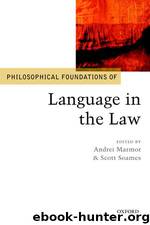Philosophical Foundations of Language in the Law by Andrei Marmor & Scott Soames

Author:Andrei Marmor & Scott Soames
Language: eng
Format: epub
Published: 2014-08-09T16:00:00+00:00
5. Textualism, hypothetical intentionalism, and the objective theory of contract
Textualism in the theory of contract interpretation has affinities for a larger view sometimes called theobjective theory of contract. This is mainly a negative doctrine according to which the private mental states of the parties have no bearing on whether a contract is in place, or what the legal effects of that contract may be. Textualism is a species of the objective theory to the extent that it grounds legal effect in public language meanings and in features of the context of utterance that are not a matter of private mental states, but which might in principle be ascertained more or less directly by a suitably placed third party. It is unclear, however, whether textualism as we have defined it must always conform to the letter of the objective theory. Suppose that Jones agrees to pay Smith $20 for ‘thatbarrel of fish’. According to the textualist, his legal obligation depends on the referent of the demonstrative phrase, and (p.139) the referent of the demonstrative may depend on which barrel Jones had in mind when he produced it. Similarly, if Fritz agrees to pay $200 for all the beer, or to deliver the bananas while they are still green, it may turn out that the domain of the quantifier (‘all’) or the extension of the vague predicate (‘green’) is determined not by objective features of the context, but by the subjective intentions of the parties. If so, textualism is not strictly compatible with the objective theory. And yet the views have a clear affinity. Both hold that mental states that do not contribute in these fairly specific ways to the proposition expressed by a contract provision in a given context play no role whatsoever in determining the legal effect of the contract. In particular, both hold that the parties’ subjective legal beliefs and intentions—their beliefs and intentions about the legal consequences of their agreement—play no such constitutive role; and that is the feature of the views that will matter in what follows.
Textualism is not the only version of the objective theory. One salient alternative is the view that the legal effect of a contract is determined by the legal intentions that a third party apprised of the language of the contract and of relevant background circumstances—though not of the real intentions of the parties—would attribute to the parties on the basis of this information.15 The difference between this view, which we may call Hypothetical Intentionalism, and textualism is clearest in cases of scrivener's error. Suppose a contract provides that A ‘agrees to sell the horse Beauty to B for $30.75’. If Beauty is a healthy horse, as anyone familiar with the circumstances of the contract would know, then a reasonable third party would conclude that the decimal point was a draftsman's error, and that the real price for the horse under the contract is $3,075. (This would be even clearer if the contract lists prices for many horses all in a range around $3,000 with every other price rounded to the nearest dollar.
Download
This site does not store any files on its server. We only index and link to content provided by other sites. Please contact the content providers to delete copyright contents if any and email us, we'll remove relevant links or contents immediately.
Cecilia; Or, Memoirs of an Heiress — Volume 1 by Fanny Burney(32546)
Cecilia; Or, Memoirs of an Heiress — Volume 2 by Fanny Burney(31944)
Cecilia; Or, Memoirs of an Heiress — Volume 3 by Fanny Burney(31929)
The Lost Art of Listening by Michael P. Nichols(7494)
Asking the Right Questions: A Guide to Critical Thinking by M. Neil Browne & Stuart M. Keeley(5759)
We Need to Talk by Celeste Headlee(5608)
On Writing A Memoir of the Craft by Stephen King(4935)
Dialogue by Robert McKee(4389)
Pre-Suasion: A Revolutionary Way to Influence and Persuade by Robert Cialdini(4223)
I Have Something to Say: Mastering the Art of Public Speaking in an Age of Disconnection by John Bowe(3872)
Elements of Style 2017 by Richard De A'Morelli(3341)
The Book of Human Emotions by Tiffany Watt Smith(3300)
Fluent Forever: How to Learn Any Language Fast and Never Forget It by Gabriel Wyner(3077)
Name Book, The: Over 10,000 Names--Their Meanings, Origins, and Spiritual Significance by Astoria Dorothy(2978)
Why I Write by George Orwell(2945)
Good Humor, Bad Taste: A Sociology of the Joke by Kuipers Giselinde(2941)
The Art Of Deception by Kevin Mitnick(2796)
The Grammaring Guide to English Grammar with Exercises by Péter Simon(2740)
Ancient Worlds by Michael Scott(2682)
